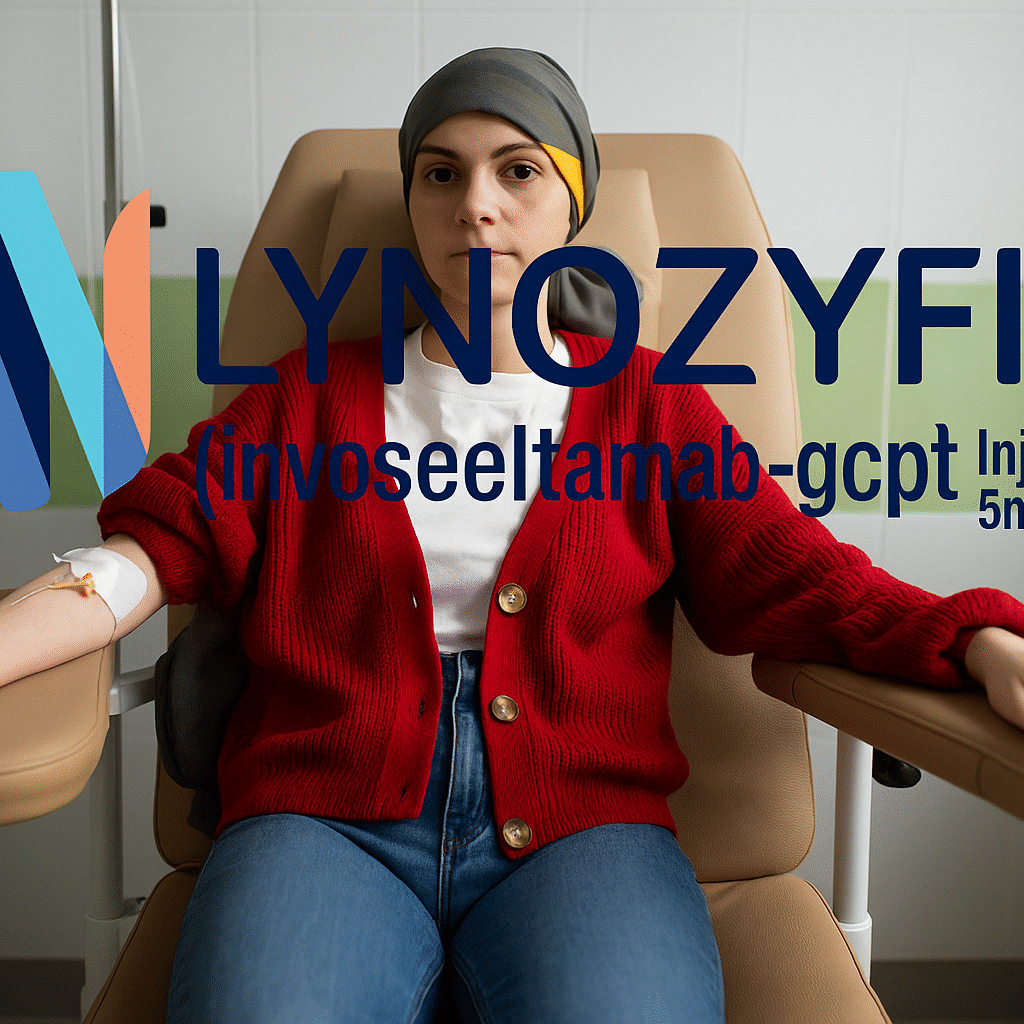Category: New Drug Approval
Written By: Dewanshee Ingale, BPharm
Reviewed By: Pharmacally Editorial Team
“Lynozyfic (Linvoseltamab-gcpt) is a bispecific BCMA-directed CD3 T-cell engager. On July 2, 2025, the U.S. Food and Drug Administration granted accelerated approval for intravenous use in adults with relapsed or refractory multiple myeloma who have received at least four prior lines of therapy, including a proteasome inhibitor, an immunomodulatory agent, and an anti-CD38 monoclonal antibody; continued approval may be conditional on confirmatory trials.” FDA granted this approval to Regeneron Pharmaceuticals, Inc.
About Lynozyfic
“Lynozyfic is developed using bispecific antibody engineering to engage the immune system against multiple myeloma cells. It binds simultaneously to BCMA on malignant plasma cells and CD3 on T cells, thereby redirecting T-cell activity toward tumor cells. The drug is administered intravenously with a step-up dosing regimen designed to reduce the risk of cytokine release syndrome, followed by maintenance dosing every two weeks. This molecular design has demonstrated clinically meaningful responses in heavily pretreated patients, although its long-term efficacy and durability remain under evaluation in ongoing confirmatory trials.”
Present data and background
“Multiple myeloma is a clonal plasma-cell malignancy of the bone marrow that commonly leads to anemia, bone pain or fractures, impaired immunity, and renal dysfunction (the classic CRAB features). First-line and relapsed regimens frequently include proteasome inhibitors, immunomodulatory agents, and anti-CD38 monoclonal antibodies. As disease becomes relapsed or refractory particularly after exposure to multiple drug classes therapeutic options and durable responses become harder to achieve. Although outcomes have improved with modern regimens and with newer approaches such as BCMA-directed CAR-T cells and bispecific antibodies, prognosis remains poorer for heavily pretreated, triple-class exposed patients, and treatment choice must be individualized. ”
Clinical trials and approval
The approval of Lynozyfic (linvoseltamab-gcpt) for relapsed or refractory multiple myeloma was supported by the pivotal, open-label, multicenter Phase 1/2 LINKER-MM1 trial (ClinicalTrials.gov Identifier: NCT03761108).
The LINKER-MM1 trial (NCT03761108) is a Phase 1/2, first-in-human study of linvoseltamab (REGN5458), a bispecific antibody targeting BCMA and CD3 for relapsed or refractory multiple myeloma. Phase 1 focused on dose-finding and safety, while Phase 2 is assessing efficacy, mainly by objective response rate (ORR), alongside durability, progression-free survival (PFS), overall survival (OS), quality of life, and safety outcomes. Eligible patients are adults who have progressed after standard therapies (proteasome inhibitors, immunomodulatory drugs, and anti-CD38 antibodies). The trial began in 2019, is active and recruiting, and is expected to complete in 2032. At the recommended 200 mg dose, results have been promising: ORR was 71%, with 50% achieving complete response or better and 63% reaching very good partial response or better. Responses were rapid (median 1–2.6 months for PR/VGPR; 8.5 months for CR) and durable, with a median duration of response of ~29 months, while PFS and OS were not yet reached; one-year survival was 75% overall and 100% in those with CR. Benefits extended to high-risk groups, including patients with adverse cytogenetics and extramedullary disease. Overall, linvoseltamab shows durable efficacy with a manageable safety profile, positioning it as a promising therapy for heavily pretreated multiple myeloma.
Safety profile
Lynozyfic carries a boxed warning for cytokine release syndrome (CRS) and neurologic toxicity (ICANS). In trials, CRS occurred in 46% of patients (Grade 3 <1%) and neurologic events in 54% (Grade 3–4: 8%). Serious infections, kidney injury, and fatal events (7%) were reported, with 16% discontinuing treatment. Due to these risks, Lynozyfic is restricted under a REMS program and must be given in certified centers.
Impact and future viewpoint
The FDA approval of Lynozyfic indicates an important step for patients with relapsed or refractory multiple myeloma. Results from the LINKER-MM1 trial showed strong and robust responses, with more than 50% of patients reaching a complete response or better at the recommended dose. Investigators will now expand studies into additional patient groups, refine step-up dosing schedules to reduce side effects specifically Cytokine Release Syndrome (CRS), and explore combinations with other therapies. The ongoing Phase 2 and future Phase 3 trials will confirm its long-term safety, effectiveness, and Lynozyfic place in the treatment regimens of relapsed or refractory multiple myeloma.
References
Lynozyfic™ (linvoseltamab-gcpt) Receives FDA Accelerated Approval for Treatment of Relapsed or Refractory Multiple Myeloma, US FDA, https://www.fda.gov/drugs/resources-information-approved-drugs/fda-grants-accelerated-approval-linvoseltamab-gcpt-relapsed-or-refractory-multiple-myeloma
Lynozyfic™ (linvoseltamab-gcpt) Receives FDA Accelerated Approval for Treatment of Relapsed or Refractory Multiple Myeloma, Regeneron, https://investor.regeneron.com/news-releases/news-release-details/lynozyfictm-linvoseltamab-gcpt-receives-fda-accelerated-approval
Phase 1/2 Study of REGN5458 in Adult Patients with Relapsed or Refractory Multiple Myeloma (LINKER-MM1), https://clinicaltrials.gov/study/NCT03761108

